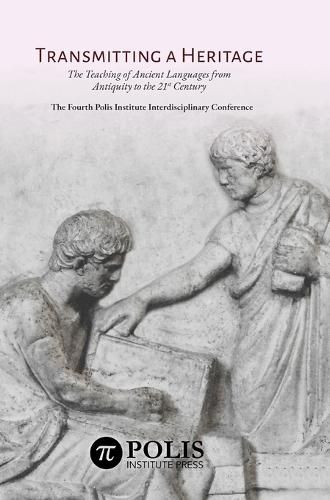Readings Newsletter
Become a Readings Member to make your shopping experience even easier.
Sign in or sign up for free!
You’re not far away from qualifying for FREE standard shipping within Australia
You’ve qualified for FREE standard shipping within Australia
The cart is loading…






This title is printed to order. This book may have been self-published. If so, we cannot guarantee the quality of the content. In the main most books will have gone through the editing process however some may not. We therefore suggest that you be aware of this before ordering this book. If in doubt check either the author or publisher’s details as we are unable to accept any returns unless they are faulty. Please contact us if you have any questions.
Three ancient languages have molded the history of Western Europe: Hebrew, Greek, and Latin. The two first are the original languages of the sacred texts of Judaism and Christianity, the religions that have most deeply influenced Western Europe through time and space. Greek and Latin have been grounded institutionally in many Western Europe educational systems for a large part of the last 2200 years. All three languages have played important roles in developing every field of study from literature and history to science and philosophy. To what extent has each of these three languages been taught in a living way since Antiquity? Are those who use Biblical Hebrew, ancient Greek, or Latin immersion in their classes innovating or rather resuming a tradition? What kind of techniques were applied in the past for teaching each of these languages? What methods should be applied today in this instruction? What can the history of ancient language pedagogy teach us about how we learn? What could be the consequences of this (re)new(ed) way of teaching among students of our day? Prefaced by Remi Brague, this book contains 18 scholarly articles (16 in English, 2 in Latin) which are accompanied by transcriptions of the lively discussions that followed most of them.
$9.00 standard shipping within Australia
FREE standard shipping within Australia for orders over $100.00
Express & International shipping calculated at checkout
This title is printed to order. This book may have been self-published. If so, we cannot guarantee the quality of the content. In the main most books will have gone through the editing process however some may not. We therefore suggest that you be aware of this before ordering this book. If in doubt check either the author or publisher’s details as we are unable to accept any returns unless they are faulty. Please contact us if you have any questions.
Three ancient languages have molded the history of Western Europe: Hebrew, Greek, and Latin. The two first are the original languages of the sacred texts of Judaism and Christianity, the religions that have most deeply influenced Western Europe through time and space. Greek and Latin have been grounded institutionally in many Western Europe educational systems for a large part of the last 2200 years. All three languages have played important roles in developing every field of study from literature and history to science and philosophy. To what extent has each of these three languages been taught in a living way since Antiquity? Are those who use Biblical Hebrew, ancient Greek, or Latin immersion in their classes innovating or rather resuming a tradition? What kind of techniques were applied in the past for teaching each of these languages? What methods should be applied today in this instruction? What can the history of ancient language pedagogy teach us about how we learn? What could be the consequences of this (re)new(ed) way of teaching among students of our day? Prefaced by Remi Brague, this book contains 18 scholarly articles (16 in English, 2 in Latin) which are accompanied by transcriptions of the lively discussions that followed most of them.